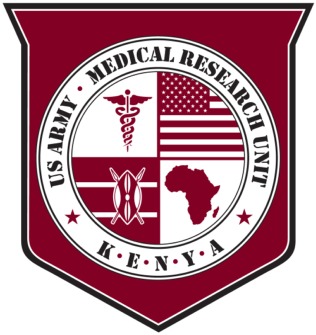


Malaria Clinical Studies
Basic Sciences
| Muriithi-Wellde CRC | Malaria Vaccine Trials | Malaria Drug Study |
Previous & Proposed studies
Muriithi-Wellde Clinical Research Center
Introduction
The Muriithi-Wellde Clinical Research Center (CRC) was initially developed by the US Army Medical Research Unit-Kenya (USAMRU-K) and the Kenya Medical Research Institute (KEMRI), with other partners, for the study of malaria vaccines and drugs. Since then it has developed into a still growing facility that is capable of conducting regulated clinical trials to evaluate vaccines, drugs, or diagnostic platforms for a variety pathogens found in sub-Saharan Africa. The facility has a capability of conducting several studies concurrently. For instance in 2005-2006, two regulated trials involving 655 study participants was conducted successfully.
The Muriithi-Wellde CRC consists of an outpatient clinic, urgent care treatment area, clinical laboratory, specimen processing center, pharmacy, and a four-bed observation suite. It was designed specifically for conducting clinical trials. Staffed with clinical officers, nurses, lab techs, pharmacy techs, drivers, and administrative personnel, it is capable of 24-hour operations throughout the year.
The Muriithi-Wellde CRC is situated opposite Kombewa Sub-District Hospital of the Kenya Ministry of Health. The hospital is being established as a study site to complement the current facilities in the conduct of both inpatient and outpatient studies.
Supporting these patient care facility are a dedicated data-entry section, IT manager, record management and admin section, GIS and mapping team, and entomology section. Additionally, the CRC is integrated with USAMRU-K’s basic science research unit in Kisumu, which can conduct ELISA, PCR, Flow-cytometry or other assays required to support the clinical study.
The Muriithi-Wellde CRC is heavily invested in capacity building for Kenyans. It is a training center for Medical Officers, Clinical Research Coordinators and microscopists/lab techs.
Recent construction of a two-story annex now offers office space, meeting rooms, and a library, all with high-speed Internet connection, to support visiting investigators, residents and students.
Malaria Transmission
Malaria transmission occurs all year but is maximal during the two rainy seasons. A longitudinal epidemiological study conducted in 2003-2004 in Kombewa indicated that monthly attack rates range from approximately 20% to 55% in children aged 1 to 3 years in the proposed study area (Figure 1). P. falciparum is present in over 90% of malaria cases. P. ovale and P. malariae, which together constitute less than 10% of cases, are usually present in mixed infections with P. falciparum.
The majority of the adult population gets malaria multiple times each year and is considered semi-immune. Though the prevalence of malaria is high only about 25% of infected adults become symptomatic.
Figure1 Malaria Attack Rates in Kombewa Division 2003-2004 (EPI study of 270 Children age 1-3 years)

Entomology & Vector Borne Diseases
Malaria Clinical Studies
Basic Sciences
Malaria Drug Studies
Malaria Vaccine Trials
HIV / AIDS
Research
Care and Treatment
Administration
Information Technology
Library
Center of Excellence (CoE)
Office of Regulatory Affairs
Employment
Links
Capacity Building
Visitor information
Medical Care / TRICARE
Areas of special interest
Contact Information
News & Events
USAMRU-K Mail